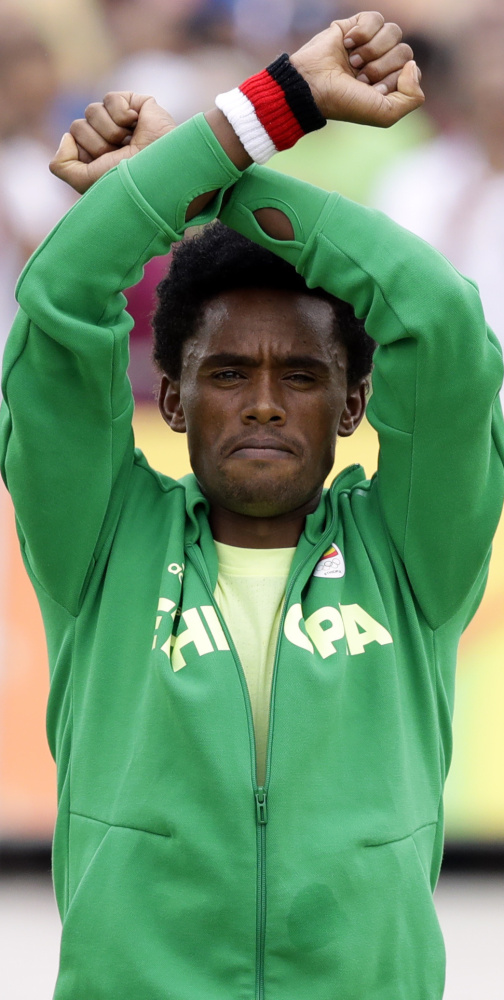Since the Rio Olympics, when Feyisa Lilesa made an anti-government gesture during the marathon, he has traveled from country to country out of fear of going home. He worries about the family he left behind in Ethiopia. His young kids ask when they will see him again.
That’s a question he just can’t answer at the moment.
Lilesa became an international figure when he crossed his wrists at the finish line last month in Brazil on his way to a silver medal. The gesture drew global attention to the recent deadly protests in his home region of Oromia.
Concerned about what might happen to him should he return to his country, Lilesa spent 2½ extra weeks in Rio before arriving in the U.S. about a week ago on a special skills visa, which allows him to train and compete until January. He hasn’t seen his wife, 5-year-old son and 3-year-old daughter since Aug. 17.
“If I would’ve taken my medal and went back to Ethiopia, that would’ve been the biggest regret of my life,” Lilesa said through a translator in a phone interview with The Associated Press as he begins speaking out in the U.S. “I wanted to be a voice for a story that wasn’t getting any coverage.”
The Oromia region has experienced enormous anti-government protests in the past few months. The government is now vowing to take drastic measures to deal with mismanagement, corruption and nepotism. But yet, the government has shown few signs of opening up the political space for opposition.
Many social media users have changed their profile pictures with the image of Lilesa crossing his wrists, and many are describing him as a national hero for speaking up and bringing it to the international arena.
The crossed-wrists gesture has been widely used by anti-government protesters in recent nationwide demonstrations as a sign of peaceful resistance, and before that by the Muslim community when it revolted against the government. It is meant to symbolize being handcuffed by security forces.
Lilesa’s not alone, either: Fellow Ethiopian Ebisa Ejigu flashed a similar gesture when he won the Quebec City Marathon on Aug. 28. Over the weekend, another Ethiopian, Tamiru Demisse, also made the “X” sign at the Rio Paralympic Games after capturing silver in the 1,500 meters.
With about 40 million people, the Oromo are Ethiopia’s largest ethnic group. Their region has seen anti-government protests since November 2015 that activists say have left more than 400 dead.
“What we are asking for is peace, justice and freedom,” said Lilesa, who’s currently in Washington, D.C., but hoping to train in a city with a higher elevation. “If the situation continues as it is, without any change, it’s going to degenerate into a conflict that could take a very, very bad direction. … We need peace. We need change.”
Lilesa said he’s received no backlash from the International Olympic Committee for his gesture.
“They came and asked me what the gesture was. I explained,” Lilesa said. “They empathized with my situation.”
And while the government assures him he will not face prosecution upon his return home and will have a “heroic welcome,” as a government spokesman recently said, he’s wary of it.
“Usually, what the government says and what the government does are very opposite,” Lilesa said. “If change comes to Ethiopia, and the regime changes, and people are finally free, I look forward to the day I can go home and meet with my people. Live with my family in peace.”
Send questions/comments to the editors.



Success. Please wait for the page to reload. If the page does not reload within 5 seconds, please refresh the page.
Enter your email and password to access comments.
Hi, to comment on stories you must . This profile is in addition to your subscription and website login.
Already have a commenting profile? .
Invalid username/password.
Please check your email to confirm and complete your registration.
Only subscribers are eligible to post comments. Please subscribe or login first for digital access. Here’s why.
Use the form below to reset your password. When you've submitted your account email, we will send an email with a reset code.